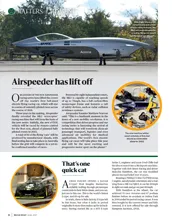
The world's fastest Jaguar E-type: one quick cat
Always fancied owning a Jaguar E-type? Most imagine themselves stylishly wafting through picturesque countryside in their 1960s classic, and you can. Just not in this one. This is the world’s…
HINTS TO ” LONDON-EXETER ” COMPETITORS.
WITH the decrease of what has been termed the “Trade Element” in our great reliability trials, these events are drawing a still greater number of novices, who previously may have been a little dubious about entering on account of the supposed advantages possessed by professional drivers.
As a matter of fact, the genuine amateur generally has far better chances of success than has the trade dnver, who often has to take either a brand new car or a much used demonstration model through the trial. The amateur, on the other hand, has the undoubted advantage of knowing his car thoroughly, and also of having more time to spend on its preparation, being still further impressed with the need of obviating all chances of failure. ‘faking things on the whole, the London-Exeter Trial is perhaps the most interesting run of the year, besides being the least expensive. The matter of expense is certainly of some importance where many amateurs are concerned, so perhaps a few hints in this direction may not be out of place. To begin with, the prevalent idea that any car or motor-cycle to be entered needs a
thorough overhaul and partial reconstruction to ensure any chance of success, is entirely erroneous. It is perfectly true that good mechanical condition is essential, but competitors are far more often let down by trivial failure than by actual mechanical breakdown..
Another reason accounting for early retirements in this event is that competitors often leave their final preparations until too late, it being a common thing for drivers to turn up at the start in a tired condition, having spent the two previous nights in assembling their vehicles after a strenuous overhaul in hurried conditions.
Even after an engine has been de-coked, it seldom gives its best output until a certain amount of steady running has been done, and generally speaking the man who leaves such jobs until a few days before the event is asking for trouble.
Hurried preparations, besides tending to upset one’s nerves, are invariably more costly than those carried out under normal conditions, so that good advice with regard to economy is to begin all the smaller adjustments and any necessary renewals in plenty of time.